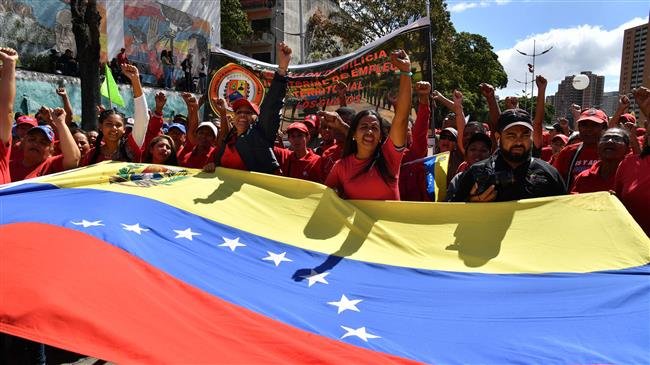The European Union has rejected use of force and military intervention in Venezuela, calling for a peaceful resolution to the political crisis, favored by Washington, in the Latin American country.
“We must avoid a military intervention,” Maja Kocijancic, the spokeswoman for the EU’s foreign policy chief, Federica Mogherini, told reporters in Brussels, Belgium, on Monday.
“What is explicitly quite clear, from our point of view, is that we need a peaceful political and democratic and Venezuelan-owned resolution of this crisis,” she added. “This obviously excludes the use of force.”
Venezuelan opposition leader Juan Guaido is in the Colombian capital of Bogota for talks with allies in the regional Lima Group of countries to ramp up pressure on President Nicolas Maduro and his democratically-elected government to step down.
Guaido, who is also the head of Venezuela’s defunct National Assembly, said a day earlier that he had plans to propose in Bogota that the US consider “all options” to oust Maduro after a bid to bring in Washington-supplied aid was blocked by the Venezuelan military.
Media reports quoted a senior US official as saying that Vice President Mike Pence was expected to announce in his speech at the summit “concrete steps” and “clear actions” on the crisis in Venezuela.
The United States is the top foreign backer of Guaido, who declared himself as the interim president last month and won immediate recognition by most Western governments.
US President Donald Trump has in the past said military intervention in Venezuela is “an option.”
Hawkish US National Security Adviser John Bolton has canceled his trip to South Korea in order to “focus on events in Venezuela.”
The so-called foreign humanitarian aid, which Maduro has denounced as a US plot to disguise an intervention in Venezuela, has now become the key focus of the standoff between the socialist leader and Guaido amid an economic crisis most significantly in the form of shortages of foodstuff and medicine.
Guaido claims that 300,000 Venezuelans could die without aid and that he would rally a million volunteers to start bringing the US shipments into the country.
The blockage of humanitarian aid at the Colombian border resulted in fierce clashes on February 22 between Venezuelan police and anti-government protesters who attempted to break through the barricaded Simon Bolivar Bridge to bring in the supplies.
The Venezuelan military has reaffirmed its support for Maduro despite Trump's threat of dire consequences if it does not abandon the president.
The country has been in political turmoil over the past weeks. The opposition has been holding widespread anti-government protests, blaming Maduro for the ailing economy, hyperinflation, power cuts, and shortages of basic items. It has been urging the president to resign while branding his re-election in the 2018 vote as a sham.


